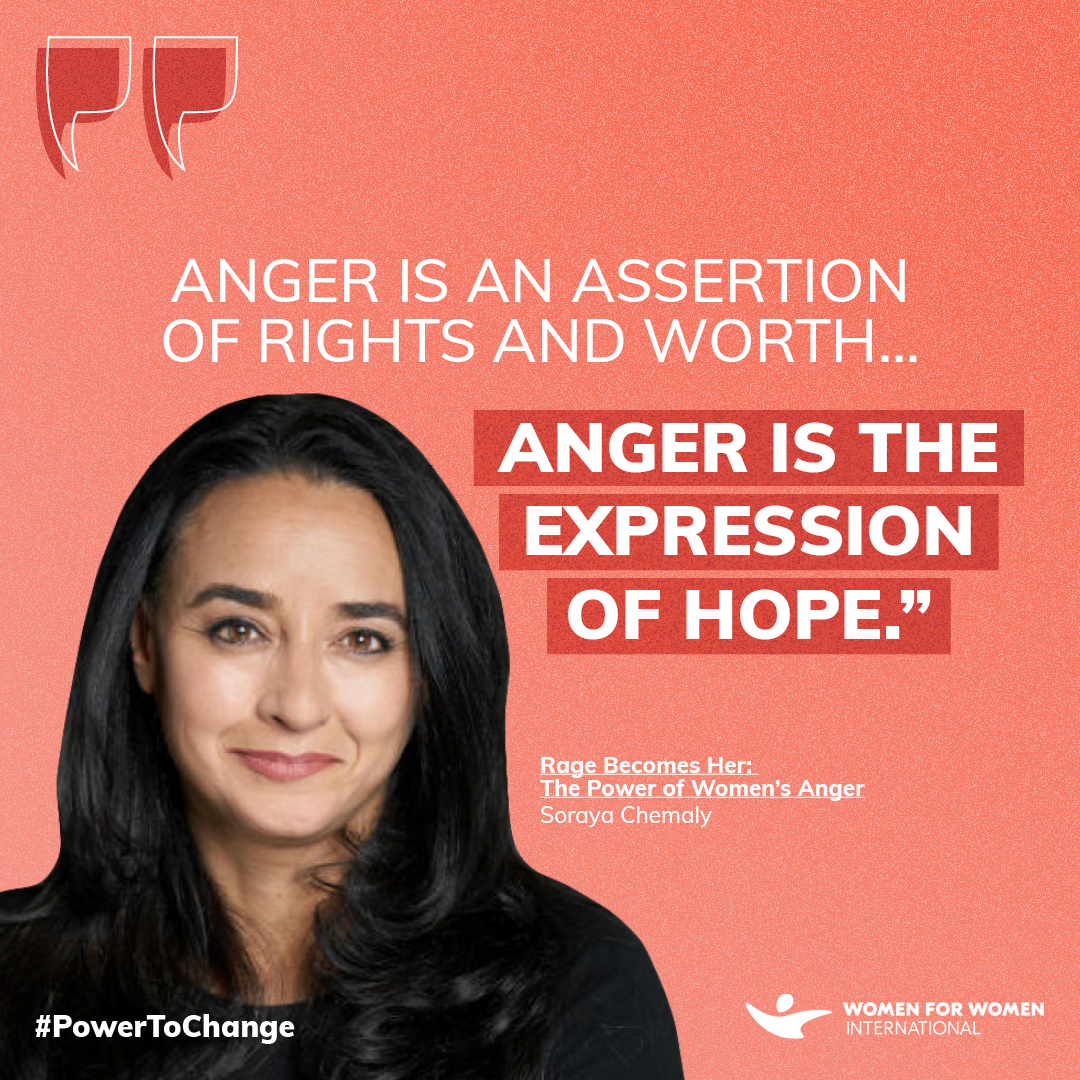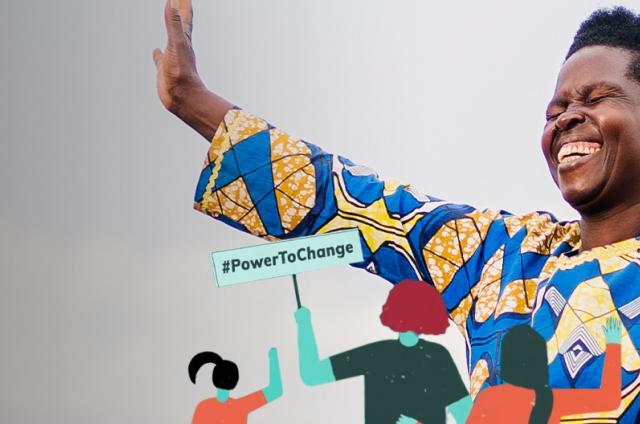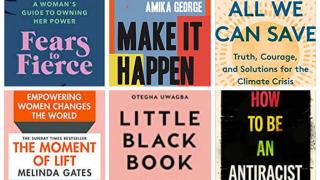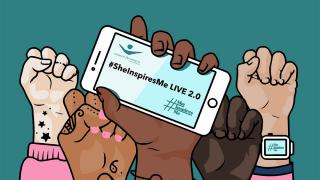Virtual Book Club: Rage Becomes Her
Welcome to the Women for Women International Book Club! This month we’re reading Rage Becomes Her: The Power of Women’s Anger by Soraya Chemaly.
As our global community harnesses our #PowerToChange leading up to International Women’s Day, we are reading Rage Becomes Her to learn how women’s anger is part of our power.
Watch the full discussion with Soraya Chemaly below.
What is this Rage Becomes Her about?
We know that anger is a powerful emotion that fuels change yet women have been taught to resist it or are punished for feeling it. Chemaly lays out how girls are conditioned from infancy to placate, ignore, and downplay feelings of anger. As girls and women grow up, their anger becomes a blight on their character, marking them for ridicule and labeling them as unstable or weak or aggressive.
Yet women and girls have so much to be angry about—and righteously so. From the dismissal of these emotions to the countless injustices that pile up, the suppression of women’s justifiable emotions has left them untethered from not only power but themselves, taking deep tolls on women’s health and wellbeing in multiple ways.
Chemaly encourages women and girls to seize their anger anyway and to develop competence for feeling and using rage. She lays out actionable ways that women can recognise and articulate their anger to spark change and also care for themselves.
Thorough in her case for women’s rage, Chemaly also includes extensive research notes and a bibliography for readers to do the same.

Discussion Questions
Check out the discussion questions included in the book below and connect with readers on Instagram to share your reactions, thoughts and questions by using the hashtag #WFWIBookClub, and tagging us with @womenforwomenuk. We want to hear what you think—share with us your take on the book!
1. Discuss the epigraphs that begin Rage Becomes Her and the quote that Chemaly includes throughout the book. How do they assist in your understanding of the book? Did you have any favorite quotes? What were they and why?
2. After seeing one of her daughters standing in “a line of fifty women and children waiting for a public restroom [while men] who were freely walking in and out of the adjacent men’s room cracked jokes about women’s vanity,” Chemaly writes an article about the experience. Describe the reaction that her article receives. Did you find it as surprising as Chemaly does? In what ways are cities sometimes more hostile to women? Discuss Women-Work-City. Why is it notable?
3. According to Chemaly, “A lot of the difficulty of the denial [of sexism] is that women’s inequality is woven into men’s identities in early childhood.” Have you heard the phrase “be a real man”? What does it mean to you? Describe pervasive gender roles that children are often raised with in American society. How can they be toxic? Explain Chemaly’s argument that “much of the denial [of sexism] we encounter is constructed to protect these masculine ideals.”
4. Chemaly concludes chapter 9, “The Politics of Denial,” with the following instructions:
Be angry.
Be loud.
Rage becomes you.
Why do you think that she includes this advice at the end of her chapter about denying women’s anger? Discuss the advice Why does Chemaly consider rage to be a positive emotion? After reading Rage Becomes Her, did your perspective on anger change? If so, how?
5. What is “choice feminism”? Why does Chemaly believe that the phrase “rings hollow for many reasons.” Do you agree? What are the perils of “choice feminism”?
6. One of the central questions that Chemaly asks in Rage Becomes her is “How many times does a woman say, ‘I’m so tired,’ because she cannot say, ‘I am so angry!’” In what ways does society teach women that being angry is a negative emotion and one that they should keep in check? Chemaly cites Rosa Parks as an example of women’s anger being denied. Why is Parks portrayed as simply tired and “quiet” in the narratives about her boycott? What’s the effect of denuding her of her feelings of outrage?
7. According to Chemaly, we learn to think of males as “the world’s risk-takers, but that is only because we don’t seriously address the risks women must take as they navigate boys and men.” Compare and contrast the risks that each gender must navigate when interacting with the world at large. Are there notable differences to you? If so, what are they? Chemaly contends that the risks women must take are more likely to be dismissed. Explain her argument.
8. Discuss the dedication of Rage Becomes Her. How has Chemaly been influenced by her mother? What lessons did her mother teach her about anger with both her words and actions? What do you think she’s passed on to her own daughters? Are there any women in your life who have encouraged you to embrace your anger? If so, how and why?
9. According to Chemaly, her family has its own fairy tale centering around her great-grandmother Zarifeh. “As the story gleefully went,” she writes, “Here we are! A romance for the ages.” Describe the story, comparing it to the reality of Zarifeh’s life. Why do you think her family imbued the story of how Zarifeh and her husband met with romantic aspects? What did you think of Chemaly’s great-grandfather upon learning the true story?
10. In praising Rage Becomes Her, Katha Pollitt writes, “If you want to understand why #MeToo has swept the country, you need to read this book.” Discuss the movement. How did it enable “women to testify [and force] communities to develop new and more nuanced words to talk about experiences that had largely remained incomprehensible to many”? What does Chemaly find so striking about the movement? Why do you think that the movement “took the world by storm”? How has it been a turning point for women?
11. In recounting how she handled a situation in which another kindergartener knocked down her daughter’s blocks, Chemaly asks “what example did I set for my angry daughter?” and concludes “I think I set an awful example.” What do you think? Why does Chemaly feel that she handled this situation badly? What did her actions communicate to her daughter? With the benefit of hindsight, how would Chemaly address this situation and why? What would you do if you were in her place?
12. Chemaly writes, “Graphic sexualizing of woman politicians and candidates isn’t ‘harmless’ fun, it’s a political strategy.” Give some examples in recent elections in which women candidates were the recipients of this type of behavior. In what ways does this strategy successfully silence women?
13. Although “critics of #MeToo and similar hashtag movements hold that they ‘don’t really do anything,’” Chemaly disagrees. Explain her argument. what purpose do hashtag movements serve? Do you think that they can be successful? What markers should the public use to judge the success of these movements?
14. Chemaly describes Nina Simone’s “Mississippi Goddam” as “one of the most moving and powerful protest songs of the twentieth century.” What inspired Simone to write the song? How was she able to use music as a weapon/ Can you think of other nonviolent ways to protest? Discuss them.
If you are thinking about buying Rage Becomes Her from Amazon UK, make sure to use Amazon Smile and choose Women for Women International as your selected charity. We receive a 0.5% donation from the price you pay, at no extra cost to you.
Read more
Women's History Month Reading Bingo!
subtitle:
Play our bingo of must read books by female authors! How many of these books have you read? How many will you add to your list this Women's History Month? Feed your mind and get inspired by authors whose powerful words and stories will inspire you to use your #PowerToChange.
This inspiration-filled reading list will help you tap into your inner strength and transform the world around you.
Your #SheInspiresMe LIVE Reading list
subtitle:
We hope #SheInspiresMe LIVE left you feeling inspired to take action and make a difference! To help you continue your journey we have collated this list of resources with books, podcasts, articles, blogs, documentaries and videos from our #SheInspiresMeLIVE speakers.



